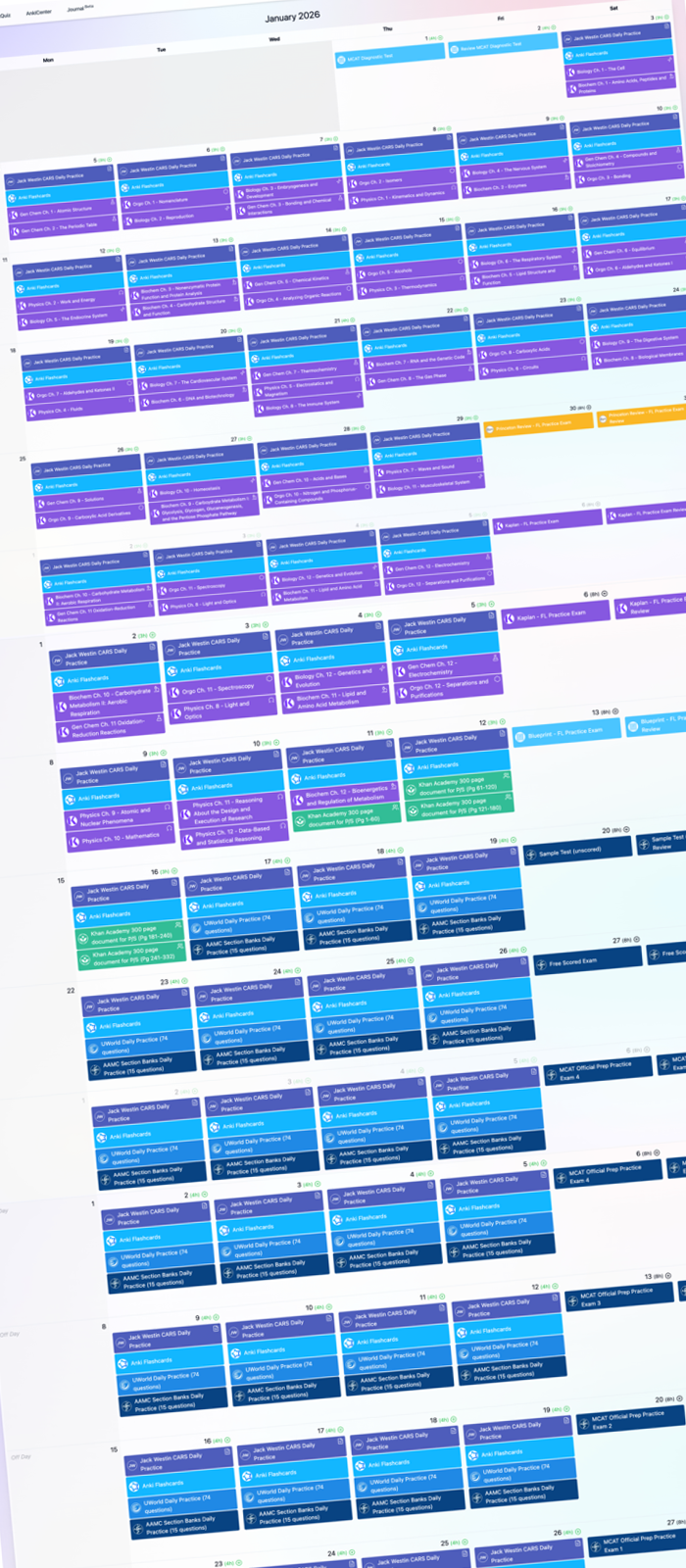MCAT Study Plan for Busy Students: How to Prep With Only 10 Hours per Week
Published on Nov 12, 2025
Why a 10-hour-per-week plan actually works
Most students need 250–300 total hours to prep well for the MCAT.
If you’re only studying ~10 hours per week, that means your timeline is naturally going to be longer — usually 5–7 months depending on how consistent you are.
This is super normal for students balancing:
- a full-time job
- a heavy course load
- research/internships
- family or personal responsibilities
The key is a clean structure and “less but better” sessions.
Step 1: Figure out your starting point
Before scheduling anything:
- How many weeks/months do you have until test day?
- Are your pre-reqs solid, rusty, or missing?
- Rough comfort in each section?
- What does your real life allow — 10 hrs every week or 10 hrs on average?
If your content foundation is very weak (didn’t take Org Chem, took Bio years ago, etc.), you may want a longer runway. Otherwise, the plan below works well.
Step 2: Understand the overall structure
A strong MCAT plan has two main phases:
Phase 1 — Content Review (~1/3 of your total hours)
This is your “learn or refresh the material” phase.
Good content review is:
- active (note-taking, short recall quizzes)
- mixed-subject (rotate Bio → Chem → Psych → CARS rather than doing one giant block of the same subject)
- high-yield focused
Phase 2 — Practice + Targeted Review (~2/3 of total hours)
Once the basics are in place, shift to doing:
- passage-based practice
- full-length exams
- targeted review of weak areas
- re-learning only the topics that keep showing up in mistakes
Most score gains happen here — not in content review.
Step 3: What 10 hours per week looks like
A typical 10-hour week might look like this:
- Tue 7–9pm → content review + a few recall questions
- Thu 7–9pm → 2–3 passages + review
- Sat 10–1 → content review (rotating subjects)
- Sun 4–6 → timed mini-set or targeted review session
You can also stack all 10 hours on weekends if that fits your work schedule.
Step 4: Your hours over time
Here’s how 250–300 hours spread at 10 hrs/week plays out:
| Total Hours Goal | Weekly Hours | Duration |
|---|---|---|
| 250 hrs | 10/wk | 25 weeks (~6 months) |
| 300 hrs | 10/wk | 30 weeks (~7 months) |
If you have 4 months or less before your test, you’ll need more weekly hours or a new test date.
Step 5: What to actually do each week
During Phase 1 (Content Review — first ~1/3 of your timeline)
Goal: build a functional foundation, not perfect mastery.
Weekly breakdown (10 hrs):
- ~6 hrs mixed content review
- ~4 hr Anki/flashcards
During Phase 2 (Practice + Targeted Review — last ~2/3)
Goal: train how the MCAT actually tests you.
Weekly breakdown (10 hrs):
- 4 hrs passage practice (AAMC + good QBanks)
- 3 hrs targeted review of mistakes
- 2 hrs timed blocks (CARS or mixed sciences)
- 1 hr flashcards + “weak topic refresh”
Every week for the weeks leading up to your exam:
- Take a half-length or full-length exam
- Spend the next session(s) reviewing it deeply
Step 6: A simple 6-month example timeline
Months 1–2 (Weeks 1–8)
Content review + short practice
- Cycle Bio/Biochem/Chem/Phys/Psych/Soc/CARS
- Don’t try to “finish a whole subject” in one go — rotate
- Add a few practice passages every week (optional)
Months 3–4 (Weeks 9–16)
Transition into practice
- Increase passage volume
- Start fixing weak areas as they appear
- First full-length around Week 10–12
- Build your error-log habits
Months 5–6 (Weeks 17–24+)
Heaviest practice phase
- A full-length every weeks
- Lots of targeted review
- Re-cover content only for topics you repeatedly miss
- Sharpen timing + stamina
Step 7: Staying consistent as a busy student
- Treat your study blocks like appointments.
- Rotate subjects so your brain doesn’t burn out.
- Never skip review — reviewing mistakes is where the learning happens.
- Take rest days seriously. More hours don’t always mean better prep.
- If you miss a week, don’t panic. Extend the plan by one week and keep going.
Step 8: How MCAT.tools fits this schedule
Your study time is limited — the tool helps you spend it wisely:
- Build a custom plan based on your hours & test date
- Automatically divide your tasks into weekly blocks
- Track your weak subjects and hours by category
- Keep your plan flexible (especially when life happens)
- Log progress so you know you’re pacing correctly
Final takeaway
10 hours a week is enough — as long as your plan is smart, structured, and consistent.
Phase 1 sets your foundation.
Phase 2 builds your score.
Stick with it, rotate subjects, review your mistakes, and let the tool keep you on track.
You’ve got this — one solid week at a time.

